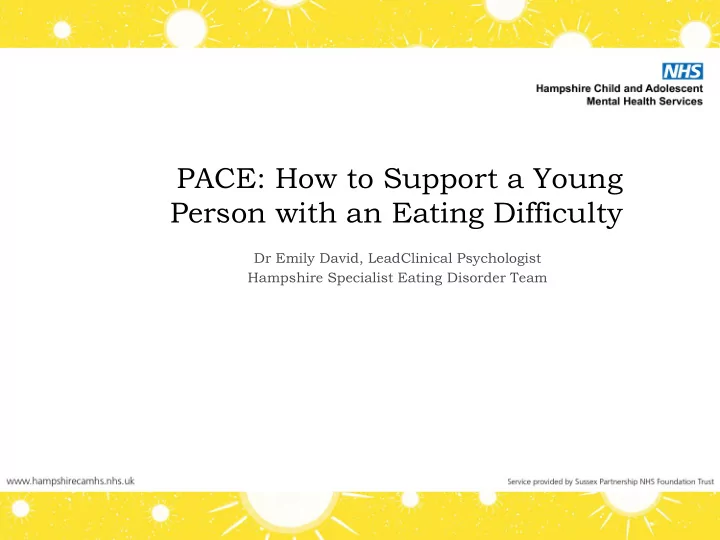

PACE: How to Support a Young Person with an Eating Difficulty Dr Emily David, LeadClinical Psychologist Hampshire Specialist Eating Disorder Team
Overview Some stats and facts What to look for; some signs and symptoms Next steps Top tips on how to support a young person Some quick Q&A
Eating Disorders- what are they? Should you be worried? 1.6 million people in the UK are estimated to be directly affected by eating disorders (11% male) 14-25 year olds are most affected by an eating disorder AN, BN, BED, OSFED (ARFID) AN ave age onset 16-17years Ave duration of illness 7years Approx 45% fully recover, 33% improve, 20% chronic 20% of AN die prematurely (physical health compromise/ suicide)
What to look for See Handout
Next Steps Speak to the school/ college/ any other agency involved in supporting/ looking after your young person Speak to your young person See GP Call EDT for more information and advice
Reactions of Carers (Treasure) Controlling; forcing change Accommodating Coach
Emotions of Carers Overwhelmed; highly sensitive Avoidance/ minimisation Calm, loving, nurturing
Top Tips Get as much support as possible (both personal and professional) Take things one day at a time Try to stay calm Be consistent, clear and boundaried in expectations Take more active responsibility in mealtimes (e.g., menu planning, meal preparation, serving of food) No diet/ low fat/ fat free foods Eat as a family where possible Model appropriate eating behaviour (avoid dieting) Plan non-problem focused talk Distraction activities post meals Try to find motivators with your young person
Things not to say… https://www.bbc.co.uk/bbcthree/clip/31b6bfb9-9d64-4445-9690- c633b727cf89
Things to remember It’s not your fault; you have not caused the eating disorder You/ the family are the greatest resource in recovery Physical health recovery occurs more quickly than psychological recovery Psychological recovery can take a long time Health and happiness needs to be prioritised
HAMPSHIRE CAMHS SPECIALIST EATING DISORDER TEAM 0300 304 0062
Recommend
More recommend